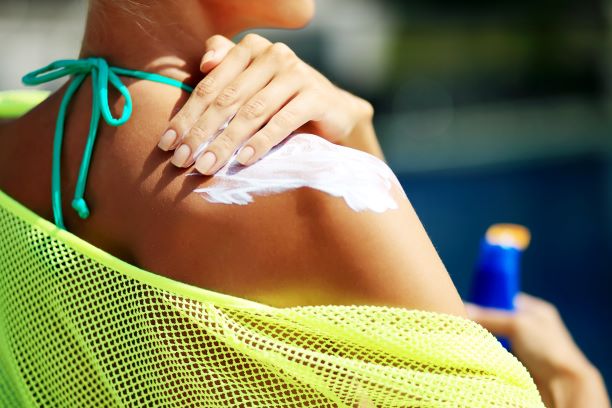Recently, articles claiming sunscreen chemicals are unsafe have many beachgoers pausing before they apply their SPF 30 this vacation season. The internet has made it easier than ever for people to get access to information about their health, but in this case, it may be doing more harm than good. After hearing about the study, we sat down with Dr. Adam Luber in Phoenix, Arizona at U.S. Dermatology Partners, formerly Southwest Skin Specialists. Dr. Luber took some time to answer our pressing questions about sunscreen safety.
What Did a Recent Study Say About Sunscreen Safety?
According to a study published by the Journal of the American Medical Association, testing that included chemical sunscreen sprays, lotions, and creams found higher than FDA recommended absorption of the chemicals avobenzone, oxybenzone, octocrylene, and ecamsule in 24 hours with recommended sunscreen application. Study participants applied these chemical sunscreens four times a day to 75% of their body, which is the minimum recommended for protection during sun prolonged exposure.
So, is it Safe for me to Keep Using Sunscreen?
According to the doctors who published the study, more research is needed to determine whether or not the higher than recommended levels of these chemicals in the bloodstream are actually harmful. Dr. Luber added, “People should also remember that there is significantly greater evidence that demonstrates UV radiation causes skin cancer, and the risk of skin cancer is greater without sunscreen. Sunscreen should still be used, given the prevalence of UV-related skin cancers.”
The American Academy of Dermatology affirmed these two points and stated, “The AAD’s sun protection recommendations are based on the existing body of scientific evidence and current FDA regulations and guidelines; these recommendations will continue to evolve as the science develops and the FDA issues new regulations. If you are concerned about the safety of the ingredients in your sunscreen, talk to a board-certified dermatologist to develop a sun protection plan that works for you.”
Should I Avoid Certain Types of Sunscreen Products?
Currently, we’re encouraging people to continue using a broad-spectrum sunscreen of SPF 30 or higher. Dr. Luber said, “While this study demonstrates that there is systemic absorption of some of the chemical ingredients in sunscreen, there is no data to conclude that there are any harmful effects from these ingredients. On the other hand, we are very aware of the damaging effects of UV radiation on the skin and strongly recommend continued use of sunscreen products.”
If you are concerned about the potential harm of using chemical sunscreens, there are valid alternatives, including sunscreens that use physical blocking agents to protect the skin from sun damage. According to Dr. Luber, “For those who want to avoid specific chemical ingredients in sunscreen, there are many products that contain physical blocking agents like zinc oxide and titanium dioxide. These minerals reflect the UV rays from the skin’s surface.” You can also wear protective clothing, hats, sunglasses, and seek shade to take a break from the sun whenever possible, especially during peak hours from 10 am to 4 pm.
So, I Still Need to Use Sunscreen – What Products do You Recommend?
You absolutely need to continue to protect yourself from the harmful effects of the sun, so Dr. Luber gave us a few basic tips for choosing sunscreens as well as specific sunscreen recommendations. According to Dr. Luber, “There are two critical components to selecting an ideal sunscreen: sun protection factor (SPF) and UV (ultraviolet) protection. We recommend SPF greater than 30 for daily use, and something stronger if you plan to be outdoors or active for extended periods of time. With UV protection, it’s important to find a sunscreen that is broad-spectrum, meaning that it protects against both UVA and UVB radiation.”
When you visit a dermatologist, you can ask for specific product recommendations based on your skin type, existing dermatologic conditions, and personal preferences. Dr. Luber said, “Many factors may dictate your specific choice of sunscreens, which vary in specific formulations, vehicles, and active ingredients. It’s important to discuss with your dermatologist the best products for your skin.”
Dr. Luber’s Recommended Sunscreen Lotions & Sprays:
Asked to make some specific product recommendations, Dr. Luber emphasized the importance of consulting with a dermatologist who can help you find the best product for your unique needs. However, he generally recommends the following products that work for most skin types:
- Neutrogena Ultra Sheer Dry-Touch
- Neutrogena Sheer Zinc (physical blocking agent)
- La Roche-Posay Anthelios
- EltaMD Sunscreen – lightweight, tinted options
- Blue Lizard Sport – great for children or active patients
- Banana Boat spray
Is Sunscreen Powder a Better Option?
A new product that many patients aren’t familiar with is sunscreen powder. This is a great option for daily use on face, hands, and other areas that receive daily sun exposure. According to Dr. Luber, “Powder sunscreens are great for oily or acne-prone skin. If you tend to have dry skin, look for finer powders that contain hyaluronic acid or ceramides that can help hydrate the skin.” While powder sunscreens are great for day to day use as part of your skin care routine, Dr. Luber says, “Powder sunscreens are great options for minor touch-ups, and they are convenient for use over makeup. However, I would warn patients from using a powder sunscreen as the primary sun protection method because the amount applied is likely insufficient to properly protect the skin at the necessary levels required, during prolonged sun exposure.”
Colorescience Sunforgettable Broad Spectrum SPF 50
One of Dr. Luber’s recommended powder sunscreen products, Colorescience Sunforgettable broad-spectrum sunscreen offers the following benefits:
- Protects again UVA/UVB rays, infrared radiation, blue (HEV) light, and pollution.
- Water resistant up to 80 minutes
- Great for acne-prone skin
- Comes in 4 different skin tint shades
Do You Have Any Other Sunscreen Tips?
Dr. Luber left us with two more simple sunscreen tips. First, he said, “Choosing a sunscreen that is right for you, your skin, and your lifestyle is an important conversation to have with your dermatologist, but ultimately, the ’best’ sunscreen is the one that you will use.” Finally, Dr. Luber reminds patients, “While sunscreen is a critical element of remaining protected against the sun, there are other ways to supplement your protection, including wearing hats, long sleeves, sun protective clothing, and sunglasses. You can also take shelter beneath shade structures and modify your behaviors to limit your sun exposure during peak hours.”
Let U.S. Dermatology Partners Help
If you want to talk to one of the skilled dermatologists at U.S. Dermatology Partners about your sunscreen options, you can fill out our simple appointment request form online. One of the local offices will be in touch shortly to schedule your visit. If you live in the Phoenix area, Dr. Luber and the Southwest Skin Specialists would love to see you, so don’t hesitate to reach out to them.
Find a location near me
or


